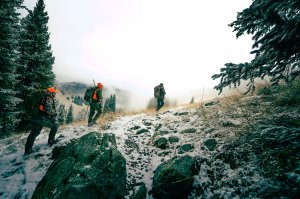Last week, the Sportsmen’s Act of 2012 came up for a vote on Unanimous Consent. For those of us who don’t spend our lives glued to C-Span or reading the Congressional Record, that means that a vote was held to pass a piece of legislation out of the Senate without going through a bunch of committees and other folderol.
Under the rules of the Senate, all 100 Senators needed to vote yes in order to move this bill forward. Senator Jon Kyl (R-AZ) stood up and said no.
Unfortunately, election-year politics sunk the timely passage of this bill. The Sportsmen’s Act of 2012 is a kind of “best of” mix tape of bills and reauthorizations of conservation programs that were penned by Republicans and Democrats alike.
That’s right, broad, bi-partisan support and a lot of across-the-aisle negotiations do work when we don’t let our personal ambitions get in the way. In fact, when the same bill was put forward as a Farm Bill amendment, Senator John Thune (R-South Dakota) was a co-sponsor.
But now, Congress is broken. Rather than let the chairman of the Congressional Sportsmen’s Caucus move this legislation forward, some folks are trying to let it die on the vine. Congress currently enjoys about a 10 percent approval rating. With shenanigans like this, it’s not hard to see why 90 percent of the country thinks we’d be better off with the Keystone Cops running things.
Ultimately, the bill came up for a Cloture Motion this past Saturday, September 22, on National Hunting and Fishing Day. The motion passed 84-7. That means that Congress will address the bill when they come back after the election for their “lame duck” session.
In order to get the votes needed to move the bill forward, Senator Tester will need some help, and not just from the guys in the Brooks Brothers suits eating caviar. He needs us: the Camo Coalition.
I’ve known Jon Tester for a few years. He’s never been one to shirk a task or fade from a fight. I like that about him. I also like that he works across the aisle with Republicans. It was Jon Tester, who, along with Idaho Congressman Mike Simpson, got wolves delisted in the Northern Rockies, which caused a tidal wave of delistings across the U.S.
As Chairman of the Congressional Sportsmen’s Caucus, Tester has led the effort to fund conservation programs that not only benefit wildlife, but benefit jobs, and our hunting industry. He’s been working on this bill since June.
Tester’s term as chairman comes to end when the gavel clangs and this Congressional session ends. We asked him about his tenure, and what he thinks about Congress’ reluctance to move legislation that benefits all of us. His reply was simple: “If this doesn’t pass, then we’ve failed as a Congress.” An 84-7 vote doesn’t happen in Congress anymore. Even naming a post office (the most banal and simple thing to do) gets hyper-political.
The Sportsmen’s Act of 2012 is the largest package of legislation for hunters and anglers in a generation. It’s time Congress stopped counting election cash and got to work helping people go hunt and fish. You can make a difference by — contacting your Senators and Representatives and urging them to move forward with this important legislation.
Here’s what the bill does:
HUNTING, FISHING AND RECREATIONAL ACCESS
Making Public Lands Public Act: This section requires that the 1.5 percent of annual LWCF funding is made available to secure, through rights-of-way, or the acquisition of lands, or interests from willing sellers, recreational public access to existing federal public lands that have significantly restricted access to hunting, fishing, and other recreational purposes. Access is the number one issue for Sportsmen. Finding places to recreate and the loss of access are the top reason sportsmen stop hunting and fishing. In an agency report to Congress (in 2003) found 35 million acres of public land had inadequate access.
Target Practice and Marksmanship Training Support Act: This section amends the Pittman-Robertson Act by adjusting the funding limitations. This allows states more funds available for a longer period of time for the creation and maintenance of shooting ranges. The bill encourages federal land agencies to cooperate with state and local authorities to maintain shooting ranges.
Polar Bear Conservation and Fairness Act: This bill allows for the Secretary to authorize permits for re-importation of legally harvested Polar Bears from approved populations in Canada before the 2008 ban.
The Hunting, Fishing and Recreational Shooting Protection Act: This section specifically excludes ammo and fishing tackle from the Toxic Substances Control Act, leaving decisions about tackle to State Fish and Game Agencies and the Fish and Wildlife Service, who currently regulate ammo and tackle. The EPA has denied petitions to regulate tackle and ammo under TSCA in 1994 and again in 2011. This codifies that the EPA does not have the ability to regulate tackle. This includes a savings clause for local, state and other federal regulations.
Bows Transported through National Parks: This provision clarifies the 2007 legislation, and will allow bows to be transported across national park lands. Currently, firearms can be legally transported, but not bows. This poses a practical problem for bow hunters who want to legally hunt on Forest Service or BLM lands, but must cross National Park Service Lands.
Billfish Conservation Act: This section prohibits the sale of Pacific-caught billfish, except in the State of Hawaii, in order to respect traditional fisheries. Billfish (marlin, sailfish and spearfish) populations have declined severely due to overfishing by non-U.S. commercial fishing fleets who harvest billfish as by-catch while targeting other species. More than two decades ago, the United States banned the commercial sale and harvest of Atlantic-caught billfish. Catch-and-release recreational angling for billfish generates many millions of dollars in economic benefits to the U.S. economy each year.
Report on Artificial Reefs in the Gulf of Mexico: This section requires report on the Idle Iron program in order to develop more coordination between agencies and states. This will assure that the interests of recreational fishermen are incorporated into the program.
HABITAT CONSERVATION
National Fish Habitat Conservation Act: This section creates a national voluntary grant program to protect and improve fish habitat by improving water quality and quantity across the nation. This section builds on current partnerships to restore waterways and provides an organic statue to authorize the work that the Fish and Wildlife Service is currently performing into one program with an advisory board.
Migratory Bird Habitat Investment and Enhancement Act: This section amends the Migratory Bird Hunting and Conservation Stamp Act so that the Secretary of the Interior, beginning in 2013 for three year periods, can set the amount to be collected for Federal Migratory Bird Hunting and Conservation Stamps. It will require the Postal Service to collect the amount established by the Secretary for each Stamp that is sold for a hunting year.
Permanent Electronic Duck Stamp Act: This section would grant the Secretary of the Interior permanent authority to authorize any state to issue electronic duck stamps. It also outlines electronic duck stamp application requirements.
Joint Ventures Authorization: This section creates an organic statute for the Joint Ventures program housed in the Fish and Wildlife Service. The Joint Venture program was established within the Fish and Wildlife Service in 1987. This language allows FWS to provide financial and technical assistance to support regional migratory bird conservation partnerships, develop and implement plans for the protection and enhancement of migratory bird populations to support migratory bird conservation.
REAUTHORIZATIONS
North American Wetlands Conservation Act Reauthorization (NAWCA): This section reauthorizes the North American Wetlands Conservation Act for another five years. NAWCA is a voluntary land-owner friendly initiative that uses incentives to provide valuable matching grants that leverage federal dollars to protect habitat that is critically important for migratory birds, such as ducks and other wildlife. Over the last 20 years, NAWCA has completed over 2,000 conservation project to protect 26.5 million acres of habitat. This voluntary program has over 4,500 partners and has leveraged nearly 3 dollars for every dollar spent by the federal government.
Partners for Fish and Wildlife: This provides provision reauthorizes the Partners for Fish and Wildlife program through 2017. This program works in a non-regulatory, cooperative fashion to help private landowners with habitat restoration on their property. This cost-share program focuses on improving wetland, riparian, in-stream, fish passage, sage-steppe, grassland and aquatic habitats that provide benefits to migratory birds, threatened or endangered species, and other sensitive and declining species.
Neotropical Migratory Birds Reauthorization: This extends the authorization for the Neotropical Migratory Bird Act which allows for voluntary conservation of critical bird habitat with 28 Projects in 26 Countries in 2012. This program leverages four dollars of matching funds for each dollar spent by the federal government.
National Fish and Wildlife Foundation Reauthorization: This section reauthorizes the National Fish and Wildlife Foundation (NFWF), a non-profit that preserves and restores our nation’s native wildlife species and habitats. Created by Congress in 1984, NFWF directs public conservation dollars to the most pressing environmental needs and matches those investments with private funds. Since its establishment, NFWF has awarded over 11,600 grants to more than 4,000 organizations in the United States, investing a total of $2 billion for conservation.
Multinational Species Conservation Fund Reauthorization: Section reauthorizes appropriations to carry out the African Elephant Conservation Act, the Rhinoceros and Tiger Conservation Act of 1994, the Asian Elephant Conservation Act of 1997, The Marine Turtle Conservation Act of 2003 and the Great Ape Conservation Act of 2000 for FY2012-FY2017. This will also allow for a five year extension on the corresponding postal stamps.
Multinational Species Conservation Funds Semipostal Stamp Reauthorization Act:This section would amend the Multinational Species Conservation Funds Semipostal Stamp Act of 2010 to require such stamps to be available for an additional four years; and provide five versions depicting African or Asian elephants, a rhinoceros, a tiger, a marine turtle or a great ape.
Federal Land Transaction Facilitation Act Reauthorization (FTFLA): This section reauthorizes the BLM’s authority to sell land to private land owners, counties, companies and others for ranching, community development and various projects. This “Land for Land” approach creates jobs and generates funding for BLM, USFS, NPS and USFWS to acquire critical in-holdings from willing sellers. The sales revenue allows agencies to acquire high priority lands with important wildlife habitat value and recreational access for hunting and fishing.
Nutria Eradication and Control Act: This section would amend the Nutria Eradication and Control Act of 2003.

